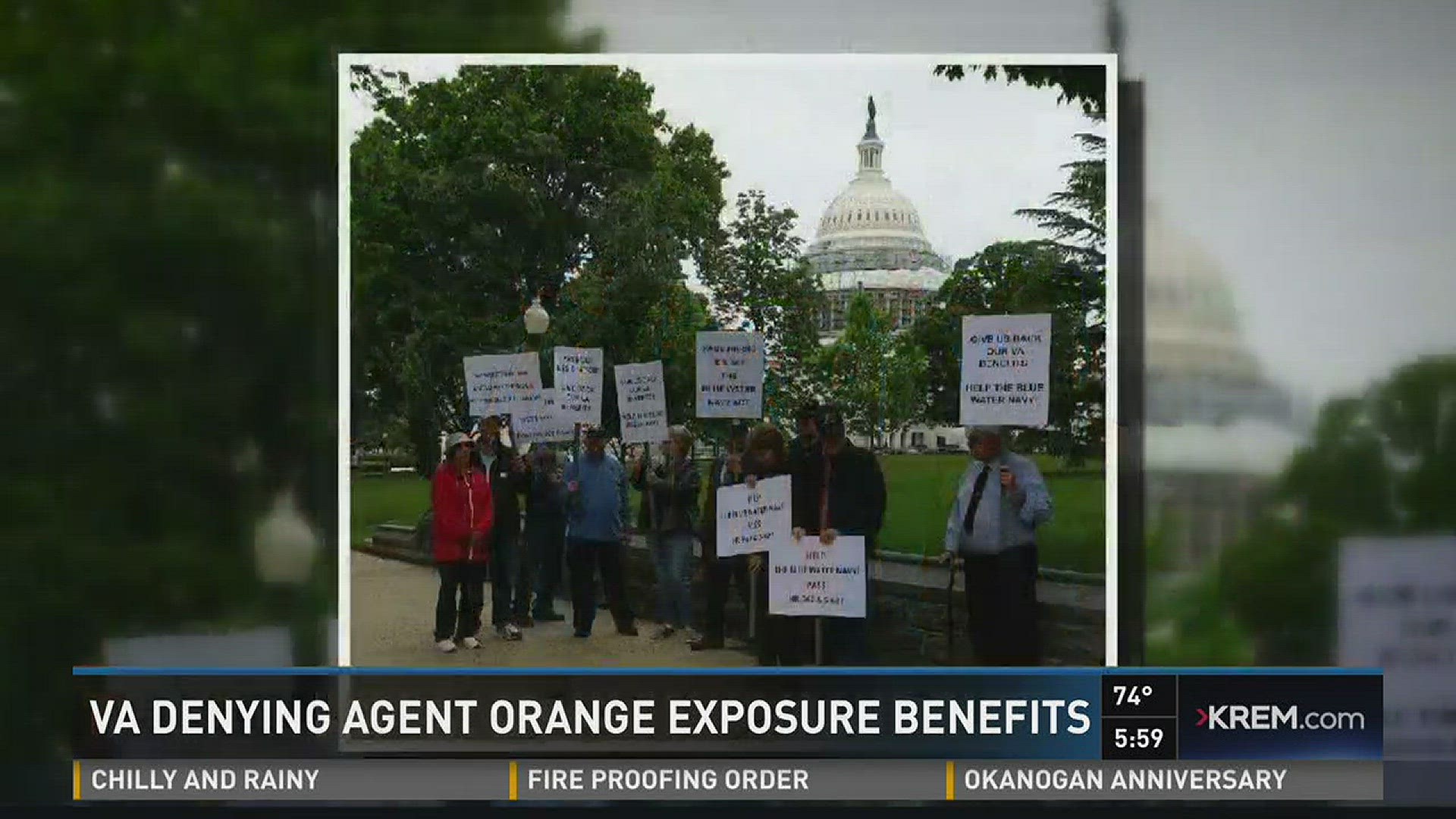SPOKANE, Wash. – A group of veterans converged on our nation’s capital Wednesday to raise awareness for their plight.
Members of the “Blue Water Navy” said tens of thousands of sailors are sick because they were exposed to toxic herbicides during the Vietnam War. They rallied to try and get traction for two bills stalled in Congress that would restore their benefits related to exposure to Agent Orange.
The head of the Blue Water Navy veterans group said there are some 90,000 living Blue Water Navy veterans who served off shore from Vietnam. He estimates half of them are suffering from some sort of health problem related to exposure to Agent Orange. One Spokane Veteran has three such health problems, but the VA is denying Agent Orange benefits to him and his entire class of veterans.
It was one plan to try and win the Vietnam War: Spray the herbicide Agent Orange and other toxic chemicals over vast stretches of jungle to deprive enemy fighters of food and cover and help save US service members lives in combat. People like Dennis Hyltin worry Agent Orange may have been the strategy to save lives then, but it is silently taking service-members' lives now.
"It's a time bomb ticking inside of you," said Hyltin.
Hyltin said that time bomb inside of him and other “Blue Navy Veterans is going unacknowledged by the federal government. Initially, the Agent Orange Act of 1991 made it clear all Vietnam Veterans were presumed to have been exposed to the toxic herbicide and should receive VA benefits for related illnesses. But in 2002, the Bush Administration quietly excluded members of the Blue Water Navy. For the last decade, Hyltin has compiled two thick binders filled with his pleas and appeals that have all been denied.
The VA recognizes Agent Orange which contains the toxic chemical dioxin, as nasty, nasty stuff. They have even compiled a list of more than a dozen diseases and illnesses they will assume are caused by Agent Orange and grant qualifying veterans full medical coverage and compensation as a result.
Hyltin has at least three of those very same conditions. Diabetes and peripheral neuropathy are just a few of them. Peripheral neuropathy is a condition of the nervous system.
Hyltin also struggles with ischemic heart disease, for which he already had a quadruple bypass, along with type 2 diabetes. He believes it has to do with Agent Orange because his doctors at the VA told him so.
Hyltin served on the USS Constellation in the Gulf of Tonkin off the coast of Vietnam.
While he launched aircraft into the fight, like tens of thousands of members of the "Blue Water Navy" Dennis never set foot on Vietnam soil. As a result, the VA does not presume his illnesses are service related.
"They say the Agent Orange stopped at the coastline; it didn't go out into the water. Well, everyone knows that's not true," said Hyltin.
If it is true dioxin got into the water, patrolling Navy vessels sucked in contaminated water and distilled it to use aboard the ships, a process that would have only concentrated the toxin. Every member of the crew would have been exposed.
"Our fresh water came from the Gulf of Tonkin because it was saltwater and they changed it into freshwater so where we're drinking, eating and bathing in this stuff," said Hyltin.
That might explain the results of a study from The Centers for Disease Control and Prevention. They found the risk of having non-Hodgkin's lymphoma was higher among men in the sea-based Navy than among other veterans. So now, the VA says those with Non-Hodgkin’s lymphoma may be granted a service connection.
Then, there is a study from the Royal Australian Navy. It revealed the highest overall levels of mortality among Australian Vietnam Veterans was with the Royal Australian Navy. Like Hyltin, they too served in the Gulf of Tonkin. On top of that, Blue Water Navy Veterans believe the planes launching from their aircraft carriers were flying through the toxic chemicals too.
After a court ordered the VA to review its policy, the VA responded a few months ago writing, "Environmental health experts in VA's Veterans Health Administration have reviewed the available scientific information and concluded that it is not sufficient to support a presumption that Blue Water Navy Veterans were exposed to Agent Orange."
It is a conclusion echoed time and again in letters to Hyltin. But hundreds of members of Congress, including Cathy McMorris Rogers, seem to believe we should ere on the side of the veterans. Both the house and senate have proposed legislation to expand coverage to the Blue Water Navy.
"Regardless of whether they served on land or at sea, those who've fallen victim, Agent Orange deserve access to the benefits and compensation," said Senator Mark Warner.
Still, that legislation does not appear to be a priority. It has been languished in committee for more than a year, which is time Dennis argues many veterans do not have.
"A lot of the people in the Blue Water Navy have died because of the exposures,” he said.
Today, Dennis subsists solely on social security, more of a struggle when saddled with a myriad of medical co-pays. So he is not giving up the fight with his country that started in the fight for his country.
"We went over there and did our duty. We did what they asked us to do," he explained. "I think now that they should take care of us."
KREM 2 contacted Congresswoman Cathy McMorris Rodgers to get her thoughts on the Blue Water Navy legislation. She said, "These blue water veterans served honorably in an area where the use of Agent Orange was prevalent, and they shouldn't be denied the opportunity to apply for disability benefits as a result of their exposure. This legislation is a step in the right direction towards removing the burden of proving their exposure to this dangerous chemical."

